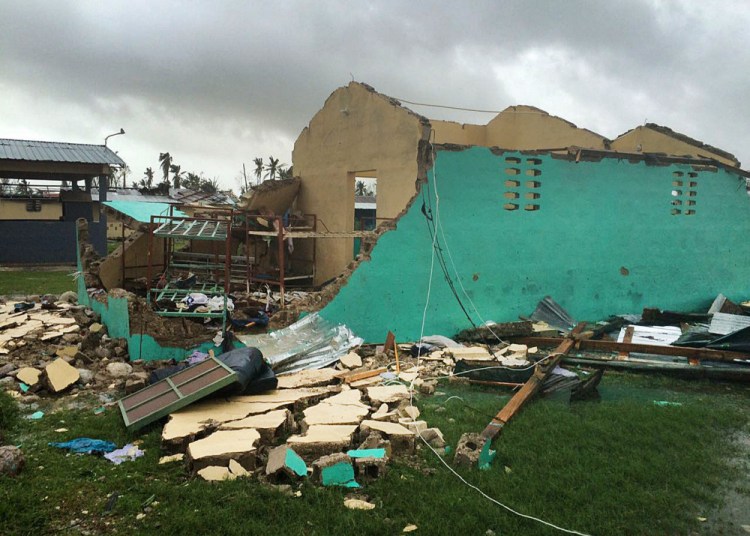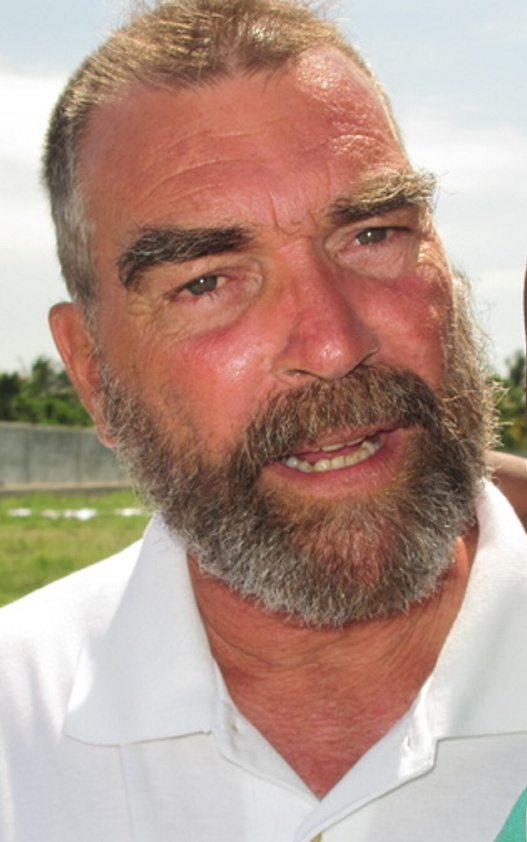Not Haiti. Not again.
“Good Lord, as if we don’t have enough to deal with,” the Rev. Marc Boisvert, a native of Lewiston, said in a telephone interview Thursday morning. “Then this thing happens.”
He meant Hurricane Matthew, which on Wednesday hammered the city of Les Cayes on the southern peninsula of Haiti.
Ten miles outside Les Cayes sits Pwoje Espwa Sud, Creole for “Project Hope South.” An orphanage founded by Boisvert in 1998, it’s long been heaven on earth to 350 Haitian children rescued from life on the streets in the Western Hemisphere’s most impoverished nation.
No longer.
Packing winds of 145 mph and rain measured in feet rather than inches, the center of the hurricane passed directly over them.
“No one was hurt, which was a miracle in itself,” Boisvert said.
But the damage is catastrophic.
Pwoje Espwa last made headlines in the Portland Press Herald back in 2010, when the treasure-salvage ship Sea Hunter sailed there from Portland laden with donated items from Maine.
Haiti had just been hit by a 7.0-magnitude earthquake, centered 100 miles east of Les Cayes. Damage to the city was minimal, but tens of thousands of Haitians had migrated there from the devastated capital of Port au Prince.
The “human tsunami,” as Boisvert called it, left the orphanage and surrounding area desperate for the 200 tons of food, clothing and medical supplies transported all the way from Portland Harbor by the Sea Hunter’s determined crew and volunteers.
I went along for that ride and spent a memorable two days at the orphanage. Known locally as Villaj Espwa, or “Hope Village,” the impeccably maintained, 125-acre campus boasted close to two dozen small dormitories, three schools, small vegetable gardens – all lit up by the smiles and laughter of kids reveling in what little they had.
Boisvert, a Roman Catholic priest who began his ministry in Maine, established the orphanage after serving as a chaplain for the military base at Guantanamo Bay in Cuba. A French speaker, he often provided translation for Haitian refugees after they’d been plucked from their sinking boats or rafts by the U.S. Coast Guard and dropped off at Guantanamo.
The refugees’ horror stories prompted Boisvert to travel to Haiti in 1997 to witness firsthand the abject poverty, widespread disease and, worst of all, children left by fate to fend for themselves. He wondered: Could life in Haiti really be as bad as they described?
In fact, it was worse.
Transformed by the experience, Boisvert sold everything he had, created Pwoje Espwa and never looked back.
“This is God’s work,” he told me back in 2010. “This is what God wants me to do.”
Boisvert is in Florida now on the tail end of a months-long fundraising trip that included a visit to Maine at the end of August.
He’s scheduled to return to the orphanage for the winter later this month.
Thursday morning, after watching helplessly from afar as the Category 4 hurricane’s eye passed directly over Les Cayes, Boisvert made brief telephone contact with the orphanage’s assistant director.
As the storm approached, the staff moved all the boys, along with their mattresses and whatever else they could carry, from their metal-roofed houses to the sturdier, two-story primary school.
There the children stayed, huddled safely behind the thick walls and plywood-covered windows while the lethal debris flew around outside.
The hurricane tore the roofs off all 16 of the male housing units. The girls’ dorms, all domed structures, remain intact.
“The boys’ housing is gone. The secondary school is gone,” Boisvert said. “The kids are now living in the primary school, which means there will be no school for the foreseeable future.”
That’s a big deal. In addition to the orphanage population, Pwoje Espwa provides schooling for 1,300 children throughout the region. Until now.
But schooling can wait. Right now, it’s a matter of basic survival.
Fortunately for the children, a shipment of fortified rice packets arrived just over a week ago. So they’ll be fed, at least for the time being.
The orphanage’s neighbors, including 200 people who took refuge just before the hurricane in the orphanage’s preschool building, pose a much bigger challenge.
Virtually everyone lost their gardens and their livestock, Boisvert said, and in the past 24 hours the crowd squeezed into the preschool already had swelled to about 400.
Many more will follow as hunger deepens, forcing the orphanage staff to strike a delicate balance between the kids’ needs and those of the surrounding community.
“The problem is if we don’t give out any food, we could have a riot on our hands,” Boisvert said. “People are desperate.”
As for rebuilding, where to begin?
A collapsed bridge on the lone route to Port au Prince has left much of Haiti’s southwestern peninsula inaccessible by land. Even the road from Pwoje Espwa to nearby Les Cayes is impassible.
So, as always, Boisvert and his fellow lifesavers make do with what they have. Starting with nine metal shipping containers, which made their way from the Sea Hunter to the orphanage – via small fishing boats and ramshackle trucks – in the final stages of the 2010 relief operation.
“We were thinking about building something with them,” Boisvert said. “I think at this point they’re probably going to be used for housing some people.”
There will be no mercy ship from Maine this time around. Still, Boisvert hopes and prays that his home state’s generosity once again will flow south.
Care to donate? Go to www.freethekids.org, the website for Pwoje Espwa’s fundraising arm in the United States, and click on the hurricane relief link.
And if you’re wondering what difference it will make, consider that only a week ago, Pwoje Espwa welcomed in 40 new kids. All are under the age of 6.
Boisvert will get back there one way or another. But while most of the East Coast breathes a sigh of relief that Matthew won’t come anywhere near us after all, the good father can only pray and anxiously await the next call from his sleep-deprived assistant director.
“I could feel the crushing sadness in his voice as he had a chance to walk around the campus and see the damage that was done,” Boisvert said. “It’s disheartening, you know?”
We can only imagine.
Copy the Story LinkSend questions/comments to the editors.





Success. Please wait for the page to reload. If the page does not reload within 5 seconds, please refresh the page.
Enter your email and password to access comments.
Hi, to comment on stories you must . This profile is in addition to your subscription and website login.
Already have a commenting profile? .
Invalid username/password.
Please check your email to confirm and complete your registration.
Only subscribers are eligible to post comments. Please subscribe or login first for digital access. Here’s why.
Use the form below to reset your password. When you've submitted your account email, we will send an email with a reset code.